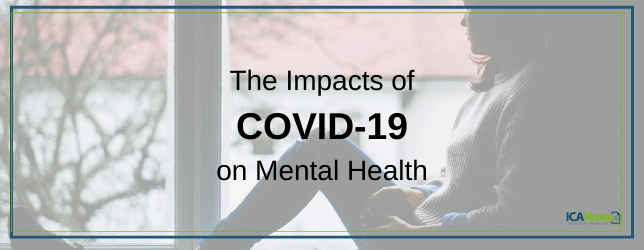The Impacts of COVID-19 on Mental Health
The COVID-19 pandemic has drastically changed lives around the world in a matter of months. Early studies about COVID-19 suggest a substantial negative impact on individuals’ mental health. Understanding the implications of the coronavirus on mental health will help you feel better prepared to assist patients.
Variations Concerning Mental Health and the COVID-19 Pandemic
Mental health changes due to the coronavirus outbreak vary. Some of the differences a patient may bring up include:
- Persistent worries about themselves or loved ones getting sick
- Differences in eating and sleeping patterns
- Trouble concentrating or remaining productive
- Increased use of alcohol or tobacco
- Exacerbation of chronic health conditions, including behavioral health concerns
A person may be more likely to experience the symptoms above — and others like them — if they are:
- Working on the front lines
- Caring for someone who has COVID-19
- Experiencing severe disruptions in their lifestyle
- Failing to practice healthy coping mechanisms
What Research Indicates About the Impacts of COVID-19 on Mental Health
It may be a while before mental health experts understand the full extent of the link between mental health and the COVID-19 pandemic, but available studies raise concerns. For example, large-scale disasters, such as hurricanes and the World Trade Center attacks, almost always trigger increased mental health issues. COVID-19 could do the same.
Other studies show the various reasons why people with mental health disorders are at an increased risk of coronavirus complications. Some individuals could experience more barriers to treatment or encounter other obstacles that could increase the likelihood of transmission and worsen existing mental health problems.
Also, 96% of Americans polled reported practicing either social distancing or sheltering in place. The mental health effects of social isolation could prove severe, especially if people don’t take proactive steps to stay in touch with loved ones through video chats, phone calls or other safe means. The survey also indicated 45% of respondents reported negative mental health impacts from COVID-19.
In a separate poll about mental health during the pandemic in Ireland, 41% of people felt lonely, while nearly a quarter experienced clinically meaningful depression.
Canadians reported mental health issues associated with COVID-19, too. An Angus Reid Institute study showed half of the respondents experiencing worsening mental health, with 44% feeling worried and 41% dealing with anxiety.
Prepare to Help More Behavioral Health Patients
Current statistics strongly suggest a rise in the number of people seeking behavioral health help due to the coronavirus may be inevitable. Get well-equipped to assist patients by using ICANotes. This behavioral health EHR software is ready to use out of the box and automates some of your routine tasks, allowing for more time spent with those who need care.
Request a free trial of our behavioral health software today to make your work simpler, efficient and more effective.
Related Posts:
COVID-19 and Your Therapy Practice
Telehealth Care Becomes More Accessible Amidst the COVID-19 Pandemic

